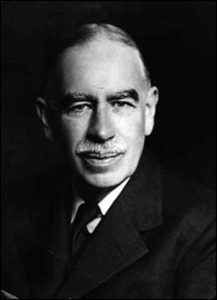By: Rob Oldham

I recently had a chance to sit down with Dr. Jeffrey Dorfman and chat about the role of the federal government in the U.S. economy. Dr. Dorfman teaches economics in UGA’s Department of Agricultural and Applied Economics. His career has spanned 25 years, from a PhD at the University of California Davis to his current position at the University of Georgia. An accomplished author, Dorfman regularly contributes to the online columns of Forbes and RealClearMarkets.com and also published Ending the Era of Free Lunch, which deals with the federal government’s encroachment on its constitutional limits.
Since the 1930s, the United States has spent trillions of dollars in order to stimulate and stabilize the U.S. economy. Spending is particularly high during recessions when government spending often spikes in order to keep unemployment low. This fiscal policy is known as Keynesian economics and was developed by eponymous British economist John Maynard Keynes. He believed that the public sector had a duty to pump money into the economy during recessions in order to smooth over the inefficiencies of the private sector, even if it meant large deficits in the annual budget.
Dr. Dorfman takes issue with the federal government’s application of Keynes’s ideas. He believes that current policy makers have misapplied the philosophy by running consistent deficits, even when the economy is strong. What Keynes really intended was for decreased government spending and budget surpluses during “booms” and government spending, even deficits, during “busts.” The federal government has apparently forgotten (or disregarded) Keynes’s qualifier since we have only registered 12 surpluses in the last 73 years. As Dorfman puts it, the current rule is “to run a deficit when times are good and a bigger deficit during the recession, and that doesn’t actually work.”
To support his claim, Dorfman points to the most recent recession from 2007-2009. The US government spent more money trying to relieve the downturn than in all previous recessions combined, even when adjusting for inflation. Yet unemployment still hovers at around 7 percent, real household income has fallen, and nearly 7 million people have swelled the ranks of the impoverished.
The American Reinvestment and Recovery Act, the $831 billion dollar stimulus bill passed in 2009, serves as a microcosm for the ill effects of the US government’s adherence to Keynesian economics. Dorfman is quick to label it as “almost a complete waste of money.” It did not efficiently distribute money to where the economy really needed it (Solyndra ring any bells?) and it was funded at the expense of the drivers of real economic growth. The $831 billion was raised completely by borrowing.
Whether the government is raising money by taxing or borrowing, it drive the notion that the state knows how to spend our money better than we do. Taxing takes money directly out of our pockets and lets the government decide how it would best ease our economic woes, while borrowing only serves to “crowd out” businesses from the lending market so the government could finance the massive debt it has accumulated due to its increasingly significant role in our economy.
The issue of borrowing is even more dangerous when we consider the $17 trillion (and growing) national debt with which we are faced. Because government spending is so pervasive in the American economy, it will become necessary to find a source of money when tax revenue runs out. Dr. Dorfman acknowledges the problem of a large debt, but not for the expected reasons. He dispels the common fear of foreign nations having leverage over us because of what we owe to them. In fact, he argues that the massive amount of debt owned by countries like China, Japan, and Brazil actually makes them beholden to us instead of the other way around. We decide if we are going to give them their money back, a powerful card to hold in the arena of international relations. The real problem with the debt is the interest payments associated with it. As our debt accumulates, we have to use more and more of our tax dollars to make interest payments to anyone who owns a treasury bond or other debt instrument. Since we are obligated to support our fast growing debt in addition to the Social Security and Medicare entitlement programs, we can expect tax rates to increase proportionally.
After considering the malevolent effects of debt associated with Keynesian economics, we are left with the question of what government should do to help its citizens in times of economic strife. Dorfman’s response to this question was a simple “nothing.” He qualified this shortly afterwards by suggesting the government step in to train workers in industries that are in need of labor. Training the unemployed to be welders or textile workers (both burgeoning industries) would be much better than paying those workers unemployment benefits. But on the whole, government should do nothing because they often end up wasting money. The essential principle is that individuals know what they want more than a government does; therefore, they will be able to more effectively direct their spending and decide which markets should be legitimately viable.
The idea that citizens would be more prosperous when given more control of their paychecks is illustrated by mandatory Social Security pensions. Social Security was conceived of during the 1930s in order to ensure that elderly Americans would be protected from the Great Depression. In exchange for giving up 6.2 percent of our monthly paychecks, we should be able to receive benefits once we get older. But is this massive spending project really helping Americans by giving them money when they are elderly and cash poor? Or is it forcing us to make the decision to pay into a bankrupt program from which we will never realize the benefits? The federal overnment paid $773 billion in benefits in 2012 but collected just $563 billion in revenue. Are we forced to pay into a bankrupt program from which we will never realize the benefits?
Dorfman says this is simply unsustainable. We will either have to cut benefits now or not pay them out later, assuming we don’t raise tax rates. As a solution, he seems to lean towards a private retirement savings account system (which could even be government administered) like the one in Chile. Workers there do not contribute towards a collective pool for benefits from which benefits will be paid out. Instead they pay into a personal account and are able to have a say in how the money is invested. This gives more autonomy to the individual and secures one’s savings so there is little fear of losing that money at a later age. This privatized, self-directed plan also eliminates the possibility that government is really wasting our Social Security by borrowing from the collective pool at their own discretion and spending that money on other projects, thus ensuring there will be little left in the reserves when current UGA students reach retirement age.
The essential idea that Dorfman conveyed was that our citizens are too dependent on the federal government. The feds have their fingers in everything from retirement savings to healthcare to farmer’s crop insurance. Even more than the deficit or national debt, excessive government spending and involvement in the economy is what threatens our future. Moreover, government has created the misconception that if they do not spend money, then it would not get spent at all. That is not true; it would have been spent. Only, the spenders would have been “Joe the Plumber” instead of “Joe the freshman congressman looking to bring home the bacon and get re-elected.” As an autonomous group pursuing our best interests, we cannot allow our economic decisions to be superseded by government institutions. The independent nature of our citizenry is what has historically set America apart from the rest of the world. Our adherence to the values of freedom, liberty, and the right to forge one’s own way should be as applicable to politics as it is to economics. This idea should lead us to an organic, self-directed economy instead of one where winners and losers are decided by arbitrary government subsidies and regulations.


